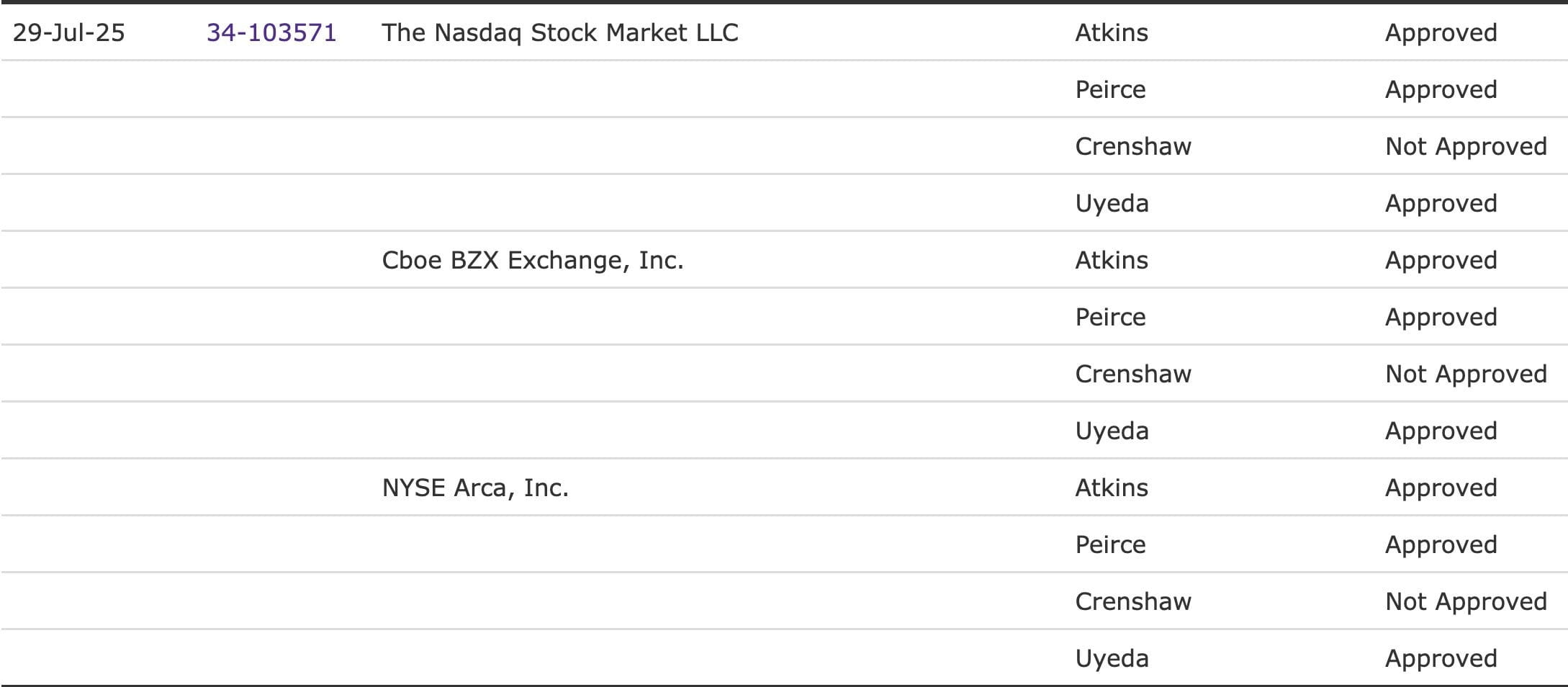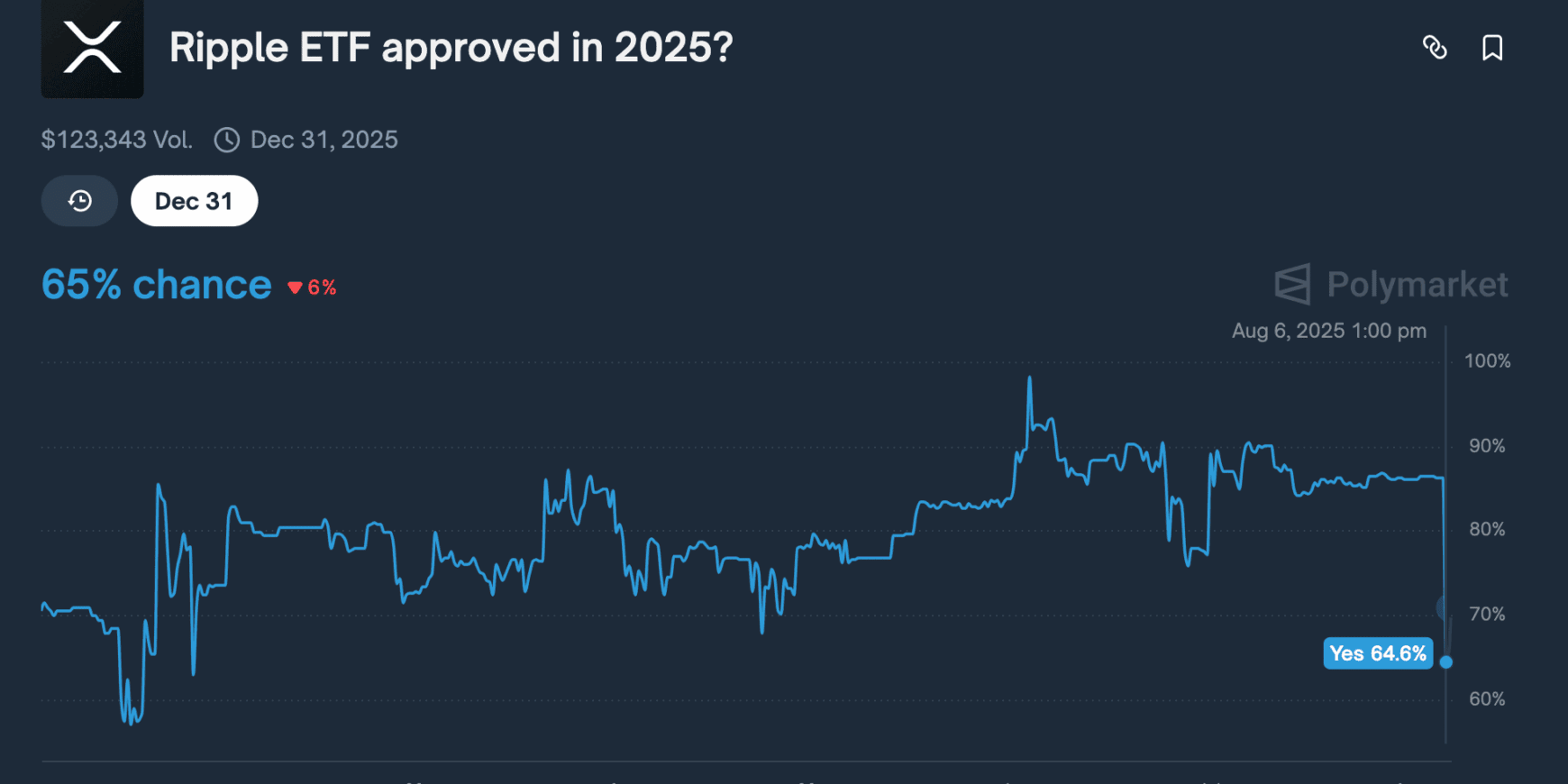U.S. Securities and Exchange Commission (SEC) Commissioner Caroline Crenshaw continues to oppose cryptocurrency exchange-traded products. This may lead to a decline in market sentiment, with the chances of approval for the XRP ETF dropping from previous highs of over 80-90% to 65%.
SEC Commissioner maintains opposition to cryptocurrency ETFs.
As of today, the U.S. Securities and Exchange Commission (SEC) has held 13 internal votes, all concerning various cryptocurrency exchange-traded products (ETP). These votes covered IBIT, BITB, GBTC, Bitwise's BTC and ETH funds, and updates on physical redemption agreements. All votes passed with a result of 3 to 1, with SEC Commissioner Caroline Crenshaw being the sole dissenting vote.
 Crenshaw is currently the only Democrat on the commission and has been resisting the growing wave of cryptocurrency ETF approvals. According to reporter Eleanor Terrett, her firm stance is conveying "a clear message" that she remains firmly opposed to cryptocurrency ETPs, including any initiatives for an XRP ETF.
Crenshaw is currently the only Democrat on the commission and has been resisting the growing wave of cryptocurrency ETF approvals. According to reporter Eleanor Terrett, her firm stance is conveying "a clear message" that she remains firmly opposed to cryptocurrency ETPs, including any initiatives for an XRP ETF.
The U.S. Securities and Exchange Commission (SEC) recently approved the physical creation and redemption of Bitcoin and Ethereum ETFs. This aligns their status with commodity-type ETPs backed by gold. Although this update is seen as a significant advancement in the infrastructure for cryptocurrency ETFs, Crenshaw's opposition stands in stark contrast. Her dissent suggests that she may continue to be an obstacle in future cryptocurrency-related votes, including the proposed XRP ETF.
Crenshaw's opposition is not limited to ETFs. She recently criticized the guidance from SEC staff regarding liquid staking, stating that it is legally weak and lacks real-world basis. She believes that the proposal is "filled with factual assumptions" and fails to provide clear guidance for industry participants.
Moreover, she strongly opposed the recent guidance issued by staff regarding stablecoins pegged to the dollar. Crenshaw stated that the statement is "defective both legally and factually" and warned that the statement distorts the actual risks of stablecoins by repeating marketing terms like "digital dollar," which, in her view, could severely mislead investors.
Such statements only deepen concerns that Crenshaw's presence may complicate the regulatory process for Ripple and the XRP ETF, especially if her influence grows or gains support within the commission.
XRP ETF sentiment volatility on Polymarket.
Due to weakened market confidence, the chances of approval for the XRP ETF have also fluctuated. Data from Polymarket shows that the approval chances once dropped to 65%, and then rebounded from a high of over 90% to 71%.
 CoinGape previously reported that after the ProShares Ultra XRP ETF (UXRP) successfully listed on the NYSE Arca on July 18, the chances of XRP ETF approval rose to 86%. However, in a recent round of SEC voting, Crenshaw voted against the application recently submitted to the NYSE Arca.
CoinGape previously reported that after the ProShares Ultra XRP ETF (UXRP) successfully listed on the NYSE Arca on July 18, the chances of XRP ETF approval rose to 86%. However, in a recent round of SEC voting, Crenshaw voted against the application recently submitted to the NYSE Arca.
Nevertheless, Bloomberg analyst Eric Balchunas remains optimistic. He stated that the SEC may approve altcoin ETPs, including the XRP ETF. His optimism stems from the fact that XRP now meets the SEC's new listing requirements, which target tokens that have been trading in derivatives for at least six months.
Additionally, there are rumors that BlackRock's XRP ETF may also be in preparation, especially as BlackRock's Director of Digital Assets, Maxwell Stein, is expected to speak at Ripple's Swell 2025 conference.
Despite the strengthening foundation for cryptocurrency ETFs, Crenshaw's ongoing resistance may still pose a problem. The influence of SEC commissioners in the coming months may determine the impact of their approval decisions.



